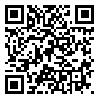Volume 23, Issue 6 (February & March 2020)
J Arak Uni Med Sci 2020, 23(6): 860-871 |
Back to browse issues page
Download citation:
BibTeX | RIS | EndNote | Medlars | ProCite | Reference Manager | RefWorks
Send citation to:



BibTeX | RIS | EndNote | Medlars | ProCite | Reference Manager | RefWorks
Send citation to:
Maschi M S, Sodagar S, Jomehri F, Hosseinzadeh Taghvai M, Forootan M. Effects of Cognitive-Behavioral Therapy on Pain Intensity and Stress Coping Styles in Patients With Gastric Wound. J Arak Uni Med Sci 2020; 23 (6) :860-871
URL: http://jams.arakmu.ac.ir/article-1-6292-en.html
URL: http://jams.arakmu.ac.ir/article-1-6292-en.html
Mohammad Sadegh Maschi1 

 , Sheida Sodagar2
, Sheida Sodagar2 

 , Farhad Jomehri1
, Farhad Jomehri1 

 , Marjan Hosseinzadeh Taghvai1
, Marjan Hosseinzadeh Taghvai1 

 , Mojgan Forootan3
, Mojgan Forootan3 




 , Sheida Sodagar2
, Sheida Sodagar2 

 , Farhad Jomehri1
, Farhad Jomehri1 

 , Marjan Hosseinzadeh Taghvai1
, Marjan Hosseinzadeh Taghvai1 

 , Mojgan Forootan3
, Mojgan Forootan3 


1- Department of Health Psychology, Faculty of Psychology, Karaj Branch, Islamic Azad University of Karaj, Iran.
2- Department of Health Psychology, Faculty of Psychology, Karaj Branch, Islamic Azad University of Karaj, Iran. ,sh_so90@yahoo.com
3- Research Institute For Gastroenterology & Liver Diseases, Taleqani Hospital, Shahid Beheshti University of Medical Sciences, Tehran, Iran.
2- Department of Health Psychology, Faculty of Psychology, Karaj Branch, Islamic Azad University of Karaj, Iran. ,
3- Research Institute For Gastroenterology & Liver Diseases, Taleqani Hospital, Shahid Beheshti University of Medical Sciences, Tehran, Iran.
Abstract: (5957 Views)
Background and Aim: Patients with the symptoms of gastrointestinal diseases and ulcers constitute a large number of patients referring to general and internal clinics. Furthermore, preliminary studies on gastric ulcers highlighted the role of psychological factors in the development of a susceptible gastric ulcer. The current study aimed to determine the effects of Cognitive-Behavioral Therapy (CBT) on pain intensity and stress coping styles in patients with gastric ulcers.
Methods & Materials: This was an experimental study with a pretest-posttest-follow-up and a control group design. The statistical population included all patients with a gastric ulcer who were referred to public health centers in Tehran City, Iran, in the winter of 2018. Among the volunteers participating in the study, 30 patients with gastric ulcers were selected by the convenience sampling method. Next, they were randomly assigned to the experimental and control groups (n=15/group). Measurement tools included the McGill Pain Questionnaire (MPQ) and the Coping Inventory for Stressful Situations (CISS; Endler & Parker, 1990). The experimental group subjects participated in eight 90-minute sessions of CBT. However, the controls received no psychological treatment in this period. For data analysis, repeated-measures Analysis of Variance (ANOVA) and post-hoc tests were applied.
Ethical Considerations: This study was approved by the Research Ethics Committee of the Islamic Azad University, Karaj Branch (Code: IR.IAU.K.REC.1397.85).
Results: The present research results signified that CBT improved problem-oriented coping styles (P<0.01) and decreased emotion-focused coping styles (P<0.01) and avoidance (P<0.01) in the test group. Besides, the mean scores of pain intensity decreased in the experimental group, compared to the controls (P<0.01).
Conclusion: The provided CBT was effective on pain intensity and stress coping styles in patients with gastric ulcers.
Methods & Materials: This was an experimental study with a pretest-posttest-follow-up and a control group design. The statistical population included all patients with a gastric ulcer who were referred to public health centers in Tehran City, Iran, in the winter of 2018. Among the volunteers participating in the study, 30 patients with gastric ulcers were selected by the convenience sampling method. Next, they were randomly assigned to the experimental and control groups (n=15/group). Measurement tools included the McGill Pain Questionnaire (MPQ) and the Coping Inventory for Stressful Situations (CISS; Endler & Parker, 1990). The experimental group subjects participated in eight 90-minute sessions of CBT. However, the controls received no psychological treatment in this period. For data analysis, repeated-measures Analysis of Variance (ANOVA) and post-hoc tests were applied.
Ethical Considerations: This study was approved by the Research Ethics Committee of the Islamic Azad University, Karaj Branch (Code: IR.IAU.K.REC.1397.85).
Results: The present research results signified that CBT improved problem-oriented coping styles (P<0.01) and decreased emotion-focused coping styles (P<0.01) and avoidance (P<0.01) in the test group. Besides, the mean scores of pain intensity decreased in the experimental group, compared to the controls (P<0.01).
Conclusion: The provided CBT was effective on pain intensity and stress coping styles in patients with gastric ulcers.
Keywords: Cognitive-Behavioral Therapy (CBT), Pain, Coping skill, Gastric ulcer, Psychosomatic syndromes
Send email to the article author
| Rights and permissions | |
 |
This work is licensed under a Creative Commons Attribution-NonCommercial 4.0 International License. |






